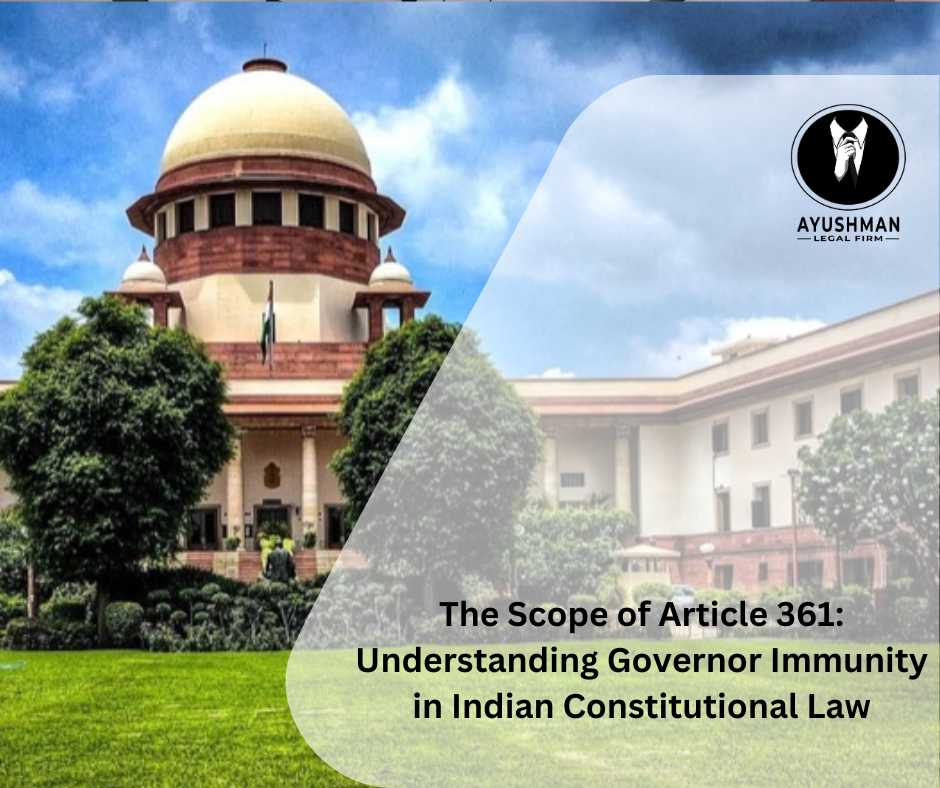Article 361 of the Indian Constitution provides specific protections to the President and Governors of states. This article has become a point of contention, particularly regarding its scope and limitations in legal proceedings, including criminal investigations. Recent debates have brought this issue to the forefront, necessitating a detailed examination of Article 361, its interpretations, and its implications.
Historical Context and Purpose of Article 361
Article 361 was conceived to ensure the smooth functioning of the highest constitutional offices in the country. It provides immunity to the President and Governors from legal action for acts done in the exercise of their powers and duties. The rationale behind this provision is to prevent frivolous litigation that could impede the functions of these high offices.
Legal Provisions and Interpretations
Text of Article 361
Article 361 reads:
- The President or the Governor of a State shall not be answerable to any court for the exercise and performance of the powers and duties of his office or for any act done or purporting to be done by him in the exercise and performance of those powers and duties.
- No criminal proceedings whatsoever shall be instituted or continued against the President, or the Governor of a State, in any court during his term of office.
- No process for the arrest or imprisonment of the President, or the Governor of a State, shall issue from any court during his term of office.
- No civil proceedings in which relief is claimed against the President, or the Governor of a State, shall be instituted during his term of office in any court in respect of any act done or purporting to be done by him in his personal capacity, whether before or after he entered upon his office, until the expiration of two months next after notice in writing has been delivered to the President or the Governor, as the case may be, or sent to him.
Judicial Interpretations
Over the years, the judiciary has interpreted Article 361 in various landmark cases. The Supreme Court of India has clarified that while the President and Governors enjoy immunity from criminal proceedings during their term, this does not extend to acts done outside the official capacity. Furthermore, post their tenure, they can be prosecuted for actions taken during their office.
The Case of Governor Immunity in Criminal Investigations
Recent Controversies
A significant controversy arose when allegations of molestation were leveled against the Governor of West Bengal. This case has reignited the debate on whether Article 361 bars investigation against a sitting Governor for criminal offenses.
Supreme Court’s Stance
The Supreme Court has sought the Attorney General’s assistance to clarify the extent of immunity provided under Article 361. The court’s primary concern is balancing the constitutional immunity of the Governor with the principles of accountability and justice.
Implications for Governance and Accountability
Immunity vs. Accountability
The immunity provided to the President and Governors is crucial for maintaining the dignity and smooth functioning of these offices. However, absolute immunity could potentially lead to misuse of power. Thus, there is a need for a balanced approach that protects the sanctity of constitutional offices while ensuring accountability.
Possible Reforms
Legal experts and scholars have suggested reforms to clarify and possibly limit the scope of immunity under Article 361. This includes distinguishing between acts done in official capacity and those done personally, and establishing clear guidelines for post-tenure accountability.
Conclusion Article 361 of the Indian Constitution plays a vital role in protecting the highest constitutional offices from undue legal hassles, ensuring they function without hindrance. However, the growing debates and judicial scrutiny underscore the need for a nuanced approach that upholds both immunity and accountability. The ongoing deliberations in the Supreme Court regarding the West Bengal Governor’s case will likely set significant precedents for the interpretation of this constitutional provision.



